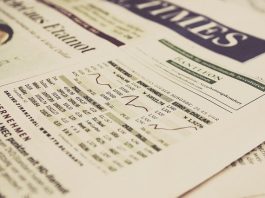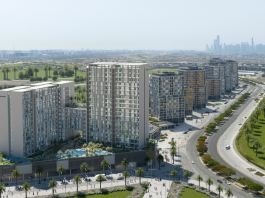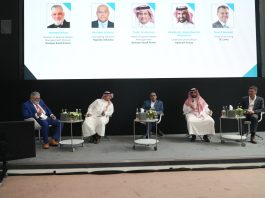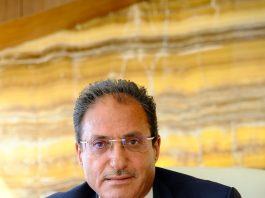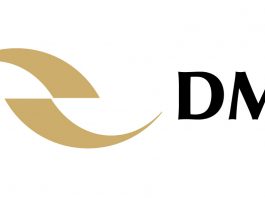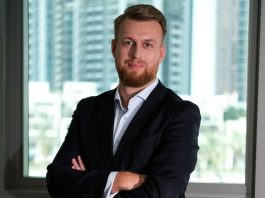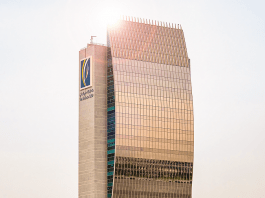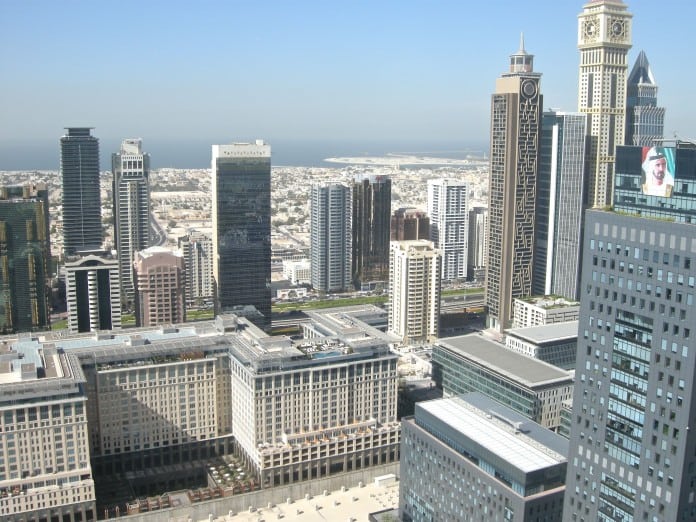
• DIFC Governor announces size of wealth and asset management sector at DIFC stands at USD 424 billion
•25th GFCI Report launched – DIFC rises from 15 to 12, highest ranking to date
• MEVP and Wamda Capital appointed to manage part of USD 100 million FinTech fund
• New agreements also announced with global FinTech hubs in Saudi, Italy and Turkey – bringing FinTech Hive’s global network up to 14
• More than 700 leading figures from across financial services sector attend second edition of GFF
Dubai International Financial Centre, the leading financial hub in the Middle East, Africa, and South Asia (MEASA) region, today hosted the second edition of the Global Financial Forum, attracting 700 leading figures from across the financial services industry to hear expert insight from some of the sector’s biggest names.
The Forum took place under the theme ‘Unlocking Growth in a Changing World’, and the incredible line-up of speakers included investment guru Mark Mobius, Sir Gerry Grimstone, the former Chairman of Barclays Bank, and Nicolas Cary, co-founder of Blockchain.
Speakers also included His Excellency Essa Kazim, the Governor of DIFC. In his welcome remarks, he announced that the size of the wealth and asset management sector at Dubai International Financial Centre is now worth USD 424 billion. His Excellency also revealed that the Centre had risen from 15th to 12th on the latest Global Financial Centres Index, reflecting the record-breaking success of DIFC over the past 12 months.
His Excellency Essa Kazim said: “Over the past 15 years, DIFC has grown into what is today a focal point for the global business and investor community, and a testament to this is amount of capital being raised in the Centre. The approximate size of the wealth and asset management industry in DIFC is now USD 424 billion. To put this in context, that is equivalent to roughly 30 percent of the combined GDP of all GCC countries.
“The wealth and asset management sector is the cornerstone of a thriving financial services industry, and is playing a significant role in attracting new businesses to Dubai and driving the increasing contribution of the sector to the Emirate’s GDP, which has risen from 3% to 3.9% – a 30% increase – in the last five years. This incredible momentum is a reflection of the enhancements we have made in our ecosystem, and in laws and regulations to support growth.”
The Forum also witnessed the official appointment of Middle East Venture Partners (MEVP) and Wamda Capital to manage USD 10 million of the DIFC FinTech Fund. The fund aims to accelerate the development of financial technology in the region by investing in start-ups from incubation through to growth stage.
The Forum also witnessed the signing of a number of key agreements aimed at driving the future of finance, including an MoU with Dubai SME to help foster entrepreneurship in the UAE and further the National Innovation Agenda.
FinTech Hive at DIFC, the region’s first and biggest FinTech accelerator and hub, also announced MoUs with three new FinTech hubs – FinTech Saudi, Milan’s FinTech District and FinTech Istanbul. The agreements bring the size of FinTech Hive’s network of strategic partnerships to 14 FinTech hubs in various parts of the world.
FinTech was one of the hot topics at this year’s GFF, which focused on the opportunities presented by disruptive technology, demographic shifts, new trends and a greater focus on sustainability in MEASA. It offered a chance for investors, entrepreneurs and members of the business community to learn more on the potential of these fast-growing markets and the opportunities to thrive in this fast-changing sector. Nicolas Cary, Co-Founder and Vice Chairman of Blockchain, gave an address to open a session on ‘Tomorrow’s Innovation Today: Top 10 FinTech Predictions for 2019 and Beyond’.
“Cryptocurrency is unique in that it’s the first financial system designed specifically for the internet age using distribution ledger technology,” said Mr Cary. “Now anyone with an internet connection has the ability to send, receive, secure and exchange value instantly and without an intermediary. Finance is being completely reimagined and we have yet to realise the true potential of this revolutionary money.”
Another of the day’s speakers, Sir Gerry Grimstone, former Chairman of Barclays Bank and Standard Life Aberdeen and now Chairman of a joint-venture between Bahrain-based Investcorp and Aberdeen Standard Investments (ASI), shared his insights for CEOs on the hunt for growth and new business in a session entitled ‘Repositioning today for tomorrow’s opportunities’.
Sir Gerry said after the session: “The City of London and the Gulf are natural partners. The fundamental economic changes taking place in the MENA region and the need to build adequate infrastructure for its diversified economies give rise to huge opportunities. I am thrilled to be chairing a new joint venture looking at infrastructure opportunities in the Gulf at this defining point in time.”
Meanwhile, the forum’s key address was delivered by Dato’ Mohamed Rafique Merican, Group Chief Executive Officer of Islamic Banking at Maybank, and Chief Executive Officer of Maybank Islamic Berhad, who has been responsible for driving the expansion of Islamic banking globally.
He said: “The GCC is a major centre for Islamic finance and trade where we have seen strong growth and development especially in the Halal Economy.
“Among the GCC nations, the UAE is the largest trading partner for ASEAN with half of trade flows between GCC and ASEAN originating from the UAE. We commend the DIEDC for developing several initiatives in developing the Halal economy which is currently being used as a benchmark by many countries and institutions.
“For an ASEAN-based bank like us, we see huge potential for Islamic trade finance to grow and we look forward to the opportunity to develop Islamic trade finance and to link trade activities between ASEAN and the OIC countries, mainly the GCC nations.”
Growth was also the topic of a panel discussion featuring Bahren Shaari, Chief Executive Officer at Bank of Singapore. Mr Shaari looked at the opportunities for wealth and asset managers in the region in the session entitled ‘New Customers, Markets and Technologies’.
He said: “Industry 4.0 is transforming economies, businesses, jobs and even society itself. Smart and connected technologies, such as artificial intelligence and the Internet of Things, are not only being embedded in organisations, but also our daily lives. Together with machine learning, robotics and automation, these technologies have become the new normal. With the proliferation of the technological hype, businesses including financial institutions are racing ahead with 4.0 initiatives of every shape and size. No one wants to be left behind.
“While it is important that businesses thoroughly understand and integrate advanced technology such as AI and robotics, they should not be blinded by the technology hype. It is integral that they have sight of the bigger picture – why are they pursuing change in the first place? – and have a clear understanding of their business goals and a roadmap for the future when they go about integrating these advanced technologies into their businesses. Technology, no matter how advanced, should be the enabler of their strategy. Not the other way round.”
Other speakers included world-renowned economic commentator Martin Wolf, from the Financial Times; Shayne Nelson, Group Chief Executive Officer of Emirates NBD; and Sunil Kaushal, Regional Chief Executive Officer, Africa and Middle East for Standard Chartered.
The Forum was held the week following the DIFC’s 2018 Annual Review, highlighting its achievements and operational results during what was a record-breaking year for DIFC. With more than 400 new companies registered and over 1,200 new jobs created in the Centre in the last year alone, the success of 2018 means that more than 23,000 professionals from more than 2,100 companies now call DIFC home.

